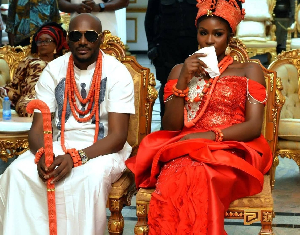Tinubu was born in the Nigerian state of Osun on March 29, 1932. Abibatu Mogaji, his mother, was a merchant who became the Iyaloja of Lagos.
He went to Children's Home School in Ibadan, Nigeria, and St. John's Primary School in Aroloya, Lagos. In 1975, Tinubu moved to the United States to study at Richard J. Daley College in Chicago, Illinois, and then at Chicago State University. He earned his Bachelor of Science in Accounting degree in 1979.
Tinubu worked with Arthur Andersen, Deloitte, Haskins & Sells, and GTE Services Corporation in the United States. Bola Tinubu returned to Nigeria in 1983 and joined Mobil Oil Nigeria, where he rose through the ranks to become a senior executive.
He entered politics in 1992 as a member of the Peoples Front faction of the Social Democratic Party, which was headed by Shehu Musa Yar'Adua and included politicians such as Umaru Yar'Adua, Atiku Abubakar, Baba Gana Kingibe, Rabiu Kwankwaso, Abdullahi Aliyu Sumaila, Magaji Abdullahi, Dapo Sarumi, and Yomi Edu. In the short-lived Nigerian Third Republic, he was elected to the Senate, representing the Lagos West constituency.
Tinubu became a founding member of the pro-democracy National Democratic Coalition after the results of the 12 June 1993 presidential elections were annulled, a party that mobilized support for the restoration of democracy and recognition of Moshood Abiola as the election's winner. He went into exile in 1994 after General Sani Abacha's takeover of power as military head of state, and returned to the country in 1998 after the military dictator's death, ushering in the Fourth Nigerian Republic.
Bola Tinubu was a protégé of Alliance for Democracy (AD) leaders Abraham Adesanya and Ayo Adebanjo in the run-up to the 1999 elections. He went on to beat Funsho Williams and Wahab Dosunmu, a former Minister of Works and Housing, in the AD primaries for the Lagos State governorship elections. He ran for Governor of Lagos State on the AD ticket in January 1999 and was elected governor.
Tinubu pledged 10,000 housing units for the poor when he took office in May 1999, but he has yet to deliver. During his eight years in office, he made significant improvements in education in the state and reduced the number of schools by returning many to their previous owners who were already settled. He also began new road building, which was necessary to meet the demands of the state's rapidly increasing population.
Tinubu was re-elected as governor in April 2003, with a new deputy governor, Femi Pedro. In those elections, the People's Democratic Party won all of the other states in the South West. He was fighting the federal government of Olusegun Obasanjo over whether Lagos State had the authority to establish new Local Council Development Areas (LCDAs) to meet the demands of its huge population.
The federal government seized funds intended for local governments in the state as a result of the dispute. He was frequently at odds with PDP leaders such as Adeseye Ogunlewe, a former Lagos State senator who had been minister of works, and Bode George, the PDP's southwest chairman, during the latter part of his term in office.
Tinubu's relationship with deputy governor Femi Pedro deteriorated after Pedro announced his intention to run for governor. Pedro ran for governor as an AC nominee in 2007 but withdrew his candidacy on the eve of the party's nomination.
He switched allegiances to the Labour Party while retaining his job as deputy governor. Tinubu's term as Lagos State Governor ended on May 29, 2007, when his replacement, the Action Congress' Babatunde Fashola, took office.
The Federal Government brought Tinubu before the Code of Conduct Bureau for trial in April 2007, after the elections but before Babatunde Fashola took office, for the suspected illicit activity of 16 different foreign accounts.
Tinubu and governors James Ibori of Delta State and Obong Victor Attah of Akwa Ibom State were cleared of charges of conspiracy, money laundering, abuse of office, and official misconduct in relation to the selling of V-mobile network shares in 2004 by the Economic and Financial Crimes Commission in January 2009.
There were rumors in March 2009 that a conspiracy to assassinate Tinubu had been discovered. Mike Okiro, the Inspector General of Police, has been tasked by the Alliance for Democracy to conduct a comprehensive investigation.
However, there were rumors in September 2009 that the British Metropolitan Police were looking into a deal in which the Lagos State government invested in Econet (now Airtel).
Tinubu claimed that the transaction was simple and lucrative for the state, with no middlemen involved.
The Federal Government has turned down an appeal from the United Kingdom for evidence to be released in order to begin the investigation and prosecution of the three Nigerian ex-governors in a London case.
Tinubu has been dubbed the "Godfather of Lagos" for wielding his political clout in the mega city-state to sway regional and national affairs.
The Lion of Bourdillion, a 2015 documentary film highlighting Tinubu's political and financial hold on the mega city-state, revealed his role in pulling the strings of the mega city-state.
Tinubu sued the makers, AIT, for N150 billion in libel, and the documentary was canceled on March 6, 2015.
Nonetheless, antecedents such as his overbearingness on successors, such as claims in December 2009 that Fashola and Tinubu had feuded over Fashola's re-election in 2011, with Tinubu preferring Muiz Banire, the commissioner for the environment.
A similar squabble in 2015 over Fashola's replacement pitted Tinubu against him, with Tinubu throwing his full weight behind Akinwunmi Ambode, who later succeeded Fashola and was single-handedly removed from office by Tinubu, who replaced him with incumbent Babajide Sanwo-Olu.
A bullion van was seen entering Tinubu's home on Bourdillion Road in Ikoyi during the 2019 election, with Tinubu saying, "I keep money wherever I want."
Tinubu was instrumental in talks to put together the fractured opposition parties into a "mega-gang" capable of challenging the People's Democratic Party (PDP) in 2007, following the PDP's landslide victory in April 2007 elections.
Tinubu's efforts to create a "super opposition" party were rewarded in February 2013, when the Action Congress of Nigeria (ACN), the Congress for Progressive Change (CPC), the All Nigeria Peoples Party (ANPP), a faction of the All Progressives Grand Alliance (APGA), and the new PDP (nPDP), a faction of serving governors of the then-governing Peoples Democratic Party (PDP), merged into the All Progressive Congress.
In 2014, Tinubu endorsed General Muhammadu Buhari, the former military head of state and leader of the APC's CPC faction, who had a large following in Northern Nigeria and had previously run for president as the APC's presidential nominee in 2003, 2007, and 2011.
Tinubu wanted to be Buhari's vice presidential nominee at first, but he eventually made way for Yemi Osibanjo, a close ally and former commissioner of justice. Buhari rode the APC to victory in 2015, breaking the PDP's sixteen-year reign and becoming the first sitting president in Nigerian history to lose to an opposition candidate.
In spite of his long-rumored presidential ambitions, Tinubu has gone on to play a key role in the Buhari administration, endorsing government policies and maintaining control of the internal faction. He backed Buhari's re-election bid in 2019, which saw him beat PDP candidate Atiku Abubakar.
Following an internal party crisis in 2020 that resulted in the resignation of Tinubu ally and party chairman Adams Oshiomole, it is thought that the change was made to derail Tinubu's presidential ambitions ahead of the 2023 election.
He is a devout Muslim. Tinubu is married to Senator Oluremi Tinubu of the Lagos Central Senatorial District. Adewale Tinubu, his nephew, is the CEO of Oando Plc. Chief Abibatu Mogaji, his mother, died on June 15, 2014, at the age of 96. Jide Tinubu, his son, died of a heart attack while in London on October 31, 2017.
In Nigeria's Niger State, he is the Asiwaju of Lagos and the Jagaban of Borgu kingdom chieftains.
General News of Monday, 29 March 2021
Source: Ada, Contributors













